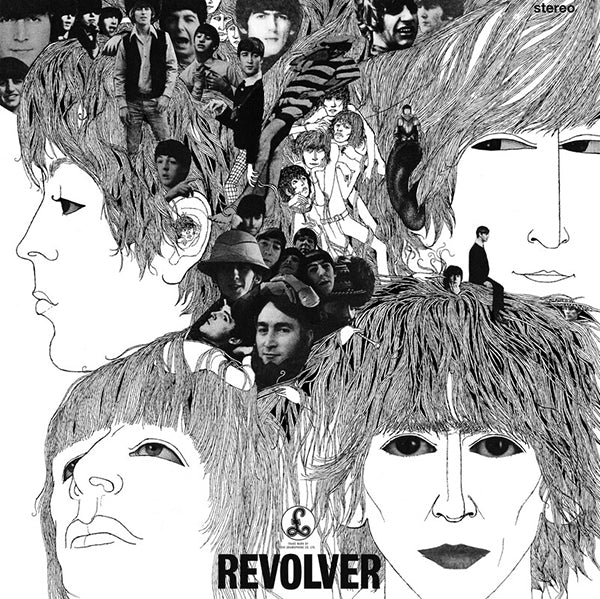Is Revolver the greatest of all Beatles albums?
Every time I am asked to write about new Beatles remixes, I’m confronted with the enormous task of listening to the entire package which, in their expanded versions, is an awful lot of material. In the case of the Revolver: Special Edition, the Super Deluxe version, there are five disks containing 63 tracks and a 100-page hardbound book in a slip case. The Super Deluxe vinyl version has four LPs and a 7-inch EP with the aforementioned book.
There are other options for the less well-heeled or insanely interested: A deluxe 2-CD Digipak with a 40-page booklet, a single-CD, a 1-LP vinyl issue, or a 1-LP vinyl record with a turntable mat with the Revolver cover artwork. You can also get it as a digital download.
Did you really expect anything less?
As for my job to review all of this, I have to deal with all the emotional issues that come with it.
Each new expanded track version and all of the associated bonus written material creates a dilemma. You see, I can’t just report this stuff. I lived this music and this forces me to confront my past in regards to where I was when first exposed and what it meant to me at time.
How could it not?
I am reviewing a holy grail of pop culture.
It’s not just the music. It’s the foundation of all that came after.
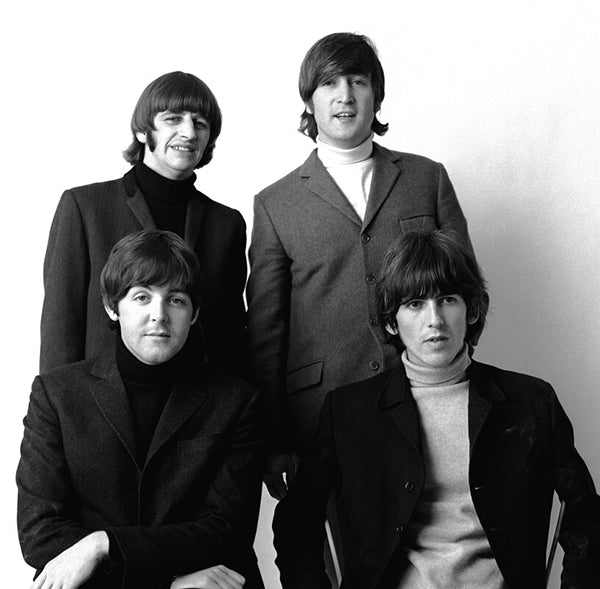
The Beatles, March 25, 1966. © Apple Corps Ltd.
Rubber Soul may represent the base camp of the acceptance of the Beatles as the greatest band to have ever existed but Revolver is where the band put on parachutes and jumped out of the plane!
I know that Rubber Soul (an album that I’m sure will be the next in line for a remix) certainly was an astonishing piece of work, but Revolver…well…read on.
It has become very fashionable over the last several years for music critics and committed Beatles fans to place Revolver ahead of Sgt. Pepper’s Lonely Hearts Club Band as the greatest of all Beatles albums. Furthermore, this new remix of Revolver has me reflecting on my own experience of hearing Revolver and Sgt. Pepper for the first time.
I was 14 when Revolver was released in August of 1966 and still 14 when Sgt. Pepper was released in May of 1967.
I clearly remember buying Revolver, going home, and listening to it on my $40 mono Westinghouse one-box record player/speaker system.
While I really loved the songs, I can’t recall my friends calling me up to discuss its “mind blowing” contents.
Yes, there were songs with violins and cellos, tambouras, sitars, French horns and backwards drums and guitars and eerie vocals, but strangely, it all seemed kind of normal because this was the Beatles after all, But in retrospect, clearly, none of this was “normal.”
The double-sided single “Paperback Writer/Rain” had come out a couple of months before the release of Revolver and that began the Beatles’ artistic sea change. This actually was the dividing line for me for when the Beatles changed from a pop band to a rock band.
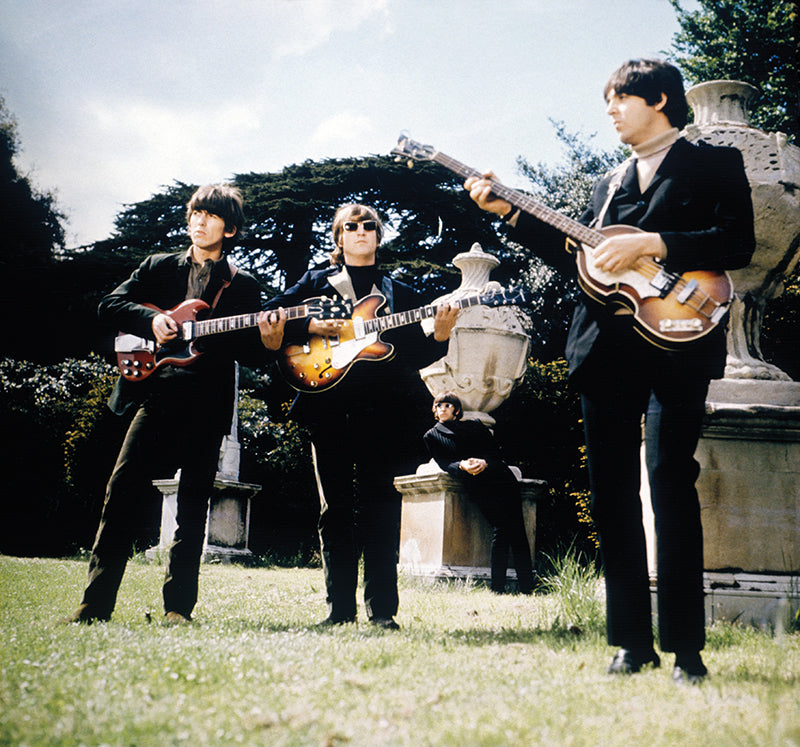
The Beatles during filming of the “Paperback Writer” and “Rain” promotional films at Chiswick House, London, 20 May 1966. © Apple Corps Ltd.
Rock was in its infancy but the Beatles were dragging us along. “Rain” sounded really weird at first while “Paperback Writer” was still a pop song. I bring this up because Giles Martin had to know full well that those sessions, recorded smack in the middle of the Revolver sessions, had to be included in this expanded Revolver package. [My interview with Giles Martin will appear in the next issue of Copper.
Remember as well that “Penny Lane” and “Strawberry Fields Forever” were supposed to be on the Sgt. Pepper album.
The Beatles, George Martin, and Brian Epstein also knew something was going on. Just look at what happened in the 12 months from April 1966 to April 1967: two incredible era-defining albums (Revolver and Sgt. Pepper) and two groundbreaking singles (“Paperback Writer”/“Rain” and “Penny Lane”/“Strawberry Fields Forever”).
Whew…the mind boggles. But I digress.
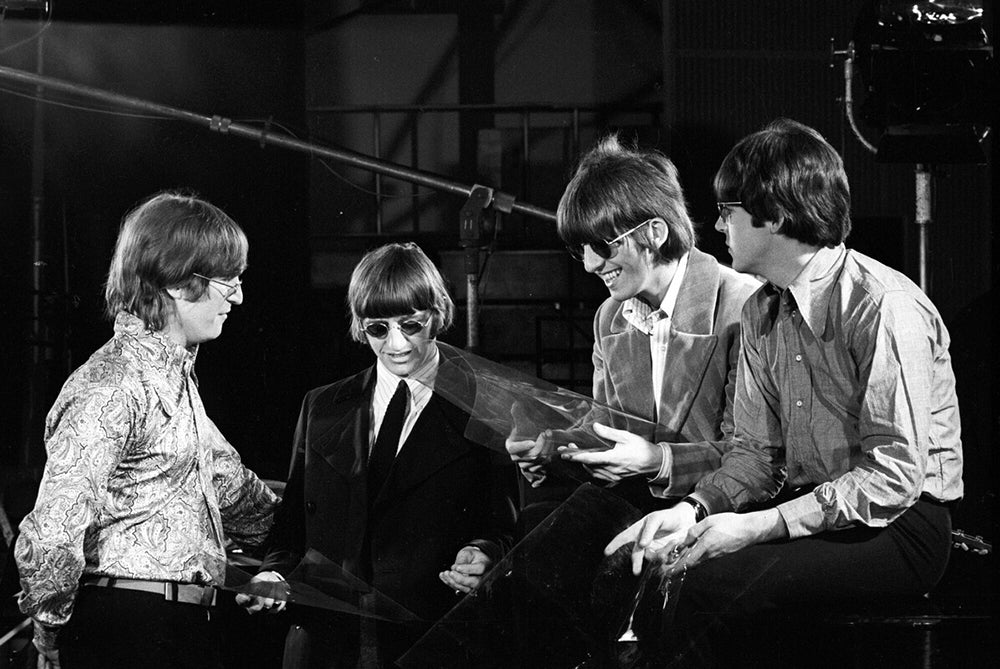
The Beatles in Abbey Road Studios during filming of the “Paperback Writer” and “Rain” promotional films, May 19, 1966. © Apple Corps Ltd.
The Beatles were still touring during the Rubber Soul period.
That ended in August of 1966 with their last live show at Candlestick Park in San Francisco. Afterward, unencumbered by the distractions of touring, the band could turn their full attention to the follow up to Rubber Soul.
The band entered Studio Three at EMI Recording Studios (now Abbey Road Studios) on April 6, 1966 and laid down the music for their most experimental track to date: “Tomorrow Never Knows.”
What an opening statement of intent! (Although it was the first song to be recorded for Revolver, it actually closes the album.) This was about as far away from moptop pop as one could get. It was so far out that I believe the band left it for the last track rather than shock their fans with it as the opening song. And, as the album closer, “Tomorrow Never Knows” was a perfect lead-in to what we could expect from Sgt. Pepper.
It was a completely non-hook-driven drone sung by John, whose vocals were processed through a rotating Leslie speaker. Ringo’s powerful incendiary drum loop pattern, George’s backwards guitar solo and tambora, and John’s totally out there lyrics seem to be setting up the following 1967 Summer of Love.
Paul McCartney told the NME (New Musical Express) in an interview at the time: “We did it because I, for one, am sick of doing sounds that people can claim had been heard before.”
The very next day, on April 7th, they wrapped up the “Tomorrow Never Knows” sessions and began recording “Got To Get You Into My Life.”
To be a fly on the wall!
It now appears as if an artistic tsunami had been unleashed.
I now can process “Tomorrow Never Knows” and its ultimate status.
Pure genius.
Upon spending so much time on re-listening to all the new remixes and bonus material (which includes early demos and slowly-developed recordings of many of the tracks – you can hear the evolution of the material as the Beatles refined it) I can say that this is one amazing package to behold.
However, as much as Revolver is absolutely groundbreaking and showed the way forward, Sgt. Pepper set the world of rock on fire and that can never be disputed. Friends of mine gathered around their newly-bought stereos just to experience the aural soundscape of Sgt. Pepper. No matter what could be written about Revolver, the zeitgeist of the 1967 Summer of Love and the almost concurrent releases of debut albums by Jimi Hendrix, the Doors, the Grateful Dead, Jefferson Airplane’s Surrealistic Pillow, and the constant media coverage of LSD guru Dr. Timothy Leary and the (soon to be Beatles spiritual leader) Maharishi Mahesh Yogi brought forth historical events that shaped the entire youth culture of the world.
It is now, upon reflection nearly 56 years later, that I can deal with the question of where Revolver sits in considering which are the “best Beatles albums.”
It is impossible to contextualize the experience of listening to the new Revolver remixes without understanding the thought process that began with the Giles Martin music remixes for the Cirque Du Soleil-produced Beatles Love show in Las Vegas, and continuing through the recent remixes The Beatles (aka the “White Album”), Abbey Road and Let it Be.
Of course, it all begins with the music, but the historical add-ons (be they alternate takes, early demos, and of course endless writing and analysis) are all monumental commercial creations and the elaborate packaging of these remix sets has grown ever more so with each project, with ever more extravagance. All of this creates “must haves” for completist Beatles fans, of which there remain millions worldwide.
If the market wasn’t there, trust me, none of these projects would continue. This is not to say that these remixes are not worthwhile, because they are for many reasons, but let us acknowledge that history will show (we are now entering the seventh decade of Beatlemania) that the Beatles will become the “classical music” of the 20th century.
The actual business of remixing Revolver could not have been done at this level of specificity even five years ago.
This is a purely technical issue.
Sgt. Pepper has been credited as the first four-track recording the Beatles made, and the ability to separate the tracks for the purpose of digitizing and remixing was fairly straightforward. Moving up to the “White Album” and beyond there were eight tracks to work with.
Revolver, however, also used multiple tracks: all the instruments on one track, extra guitars on a second track, and all the vocals on a third track – and as much as the wording “remixing” is thrown around, there is actually a process of de-mixing – pulling all the sounds out of each recording one by one – that allows the remixing to happen.

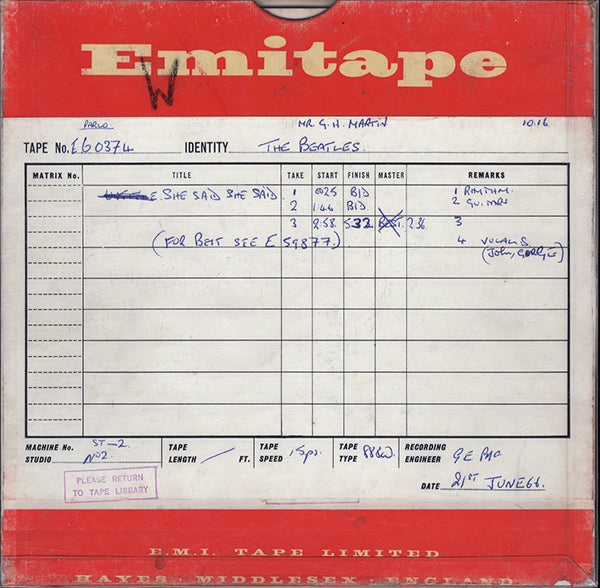
Above: original tape boxes for “Taxman,” “And Your Bird Can Sing,” and “She Said, She Said.” © Calderstone Productions Ltd.
With the remixes of Revolver, we are, for the first time, going backwards in terms of the band’s and George Martin’s recording technology (compared to the remixes of The Beatles, Abbey Road and Let it Be). This, however, did not become a problem, as the newly-available de-mixing technology allowed Giles to actually isolate not only every instrument, but almost every piece of what was then primitive backwards tape mixing and tape speed manipulation.
To hear the ultimate expression of the way the new remixes sound, I was able to listen to the album in Dolby Atmos at a listening session for journalists in a Manhattan studio. This surround-sound presentation is, under ideal circumstances, a revelation. I wondered, as I was listening, how the new remixes would fare in a normal stereo configuration. I was sent all the new mixes for listening on my home computer audio system, which is pretty sophisticated.
As I didn’t get the actual CDs or vinyl, I can’t comment on how they will sound on my reference audio system, but all things being equal, all the comparisons were done through my reference computer system, whose resolution is way above most users’.
Instruments (and vocals) that you didn’t know were there are now easy to pick out, and the surround mix is outstanding.
I got what I expected to hear and then some.
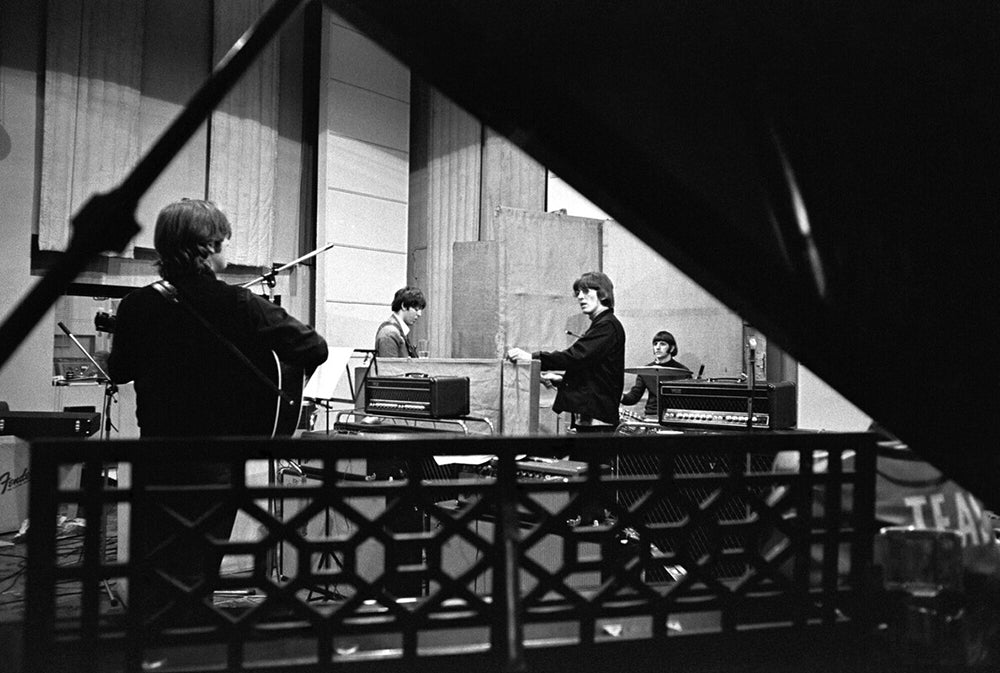
The Beatles in Abbey Road Studios during the recording of the Revolver album. © Apple Corps Ltd.
As an American who grew up with the US Capitol Records version of Revolver, the US track listing was different than the original UK release. The US version had three fewer songs: “I’m Only Sleeping,” “And Your Bird Can Sing,” and “Doctor Robert. These the were held back for a different US release, Yesterday and Today.
Over the last 20 years or so, All the US Beatles releases have been reissued with the correct (UK) track listings. Revolver was, famously, the last of the US-released “butchered” Beatles albums.
Here is the 5-disc Super Deluxe package line-up:
CD 1: the 14 tracks of the original UK release, all in newly remixed stereo:
The vocals are clearer, as are many of the instruments. They do sound great, but it takes some getting used to because of how our brains are wired to remember things as they were.
CD 2 (14 tracks):
“Tomorrow Never Knows” (two versions)
“Got To Get You Into My Life” (three versions)
“Love to You” (three versions)
“Paperback Writer” (one version)
“Rain” (two versions) – these are actually mind-blowing as they let you hear the original-speed recording, and then how the track was slowed down for the final master that we all know.
“Doctor Robert” (one take)
“And Your Bird Can Sing” (two versions)
CD 3 (17 tracks):
“And Your Bird Can Sing” (second, version Take 5)
“Taxman” (Take 11)
“I’m Only Sleeping” (three versions)
“Eleanor Rigby” (two versions)
“For No One” (one version)
“Yellow Submarine” (four versions) – the development of this song from acoustic demo to finished product is astounding.
“Here, There and Everywhere” (Take 6)
“She Said, She Said” (John’s demo)
“She Said, She Said” (Take 15)
CD 4: the mono remastered version of Revolver:
CD 5: the Revolver EP
“Paperback Writer” (new stereo mix)
“Rain” (new stereo mix)
“Paperback Writer” (original mono mix remastered)
“Rain” (original mono mix remastered)
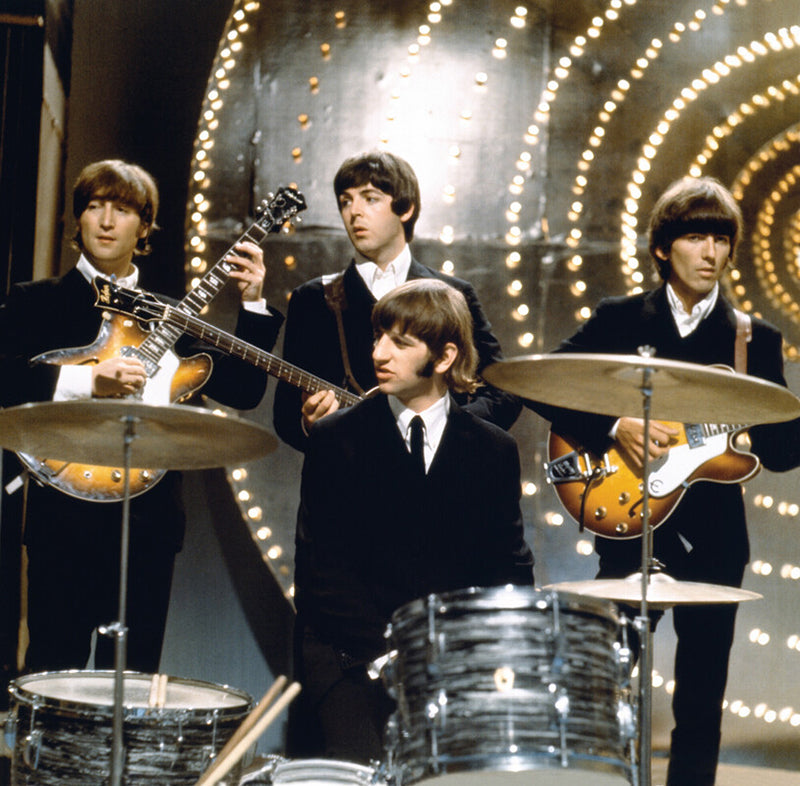
The Beatles performing “Paperback Writer” on Top of The Pops, June 16, 1966. © Apple Corps Ltd.
For me, I have come to the conclusion that “And Your Bird Can Sing” is one of the greatest pure guitars-and-vocal tracks Lennon (as lead vocalist) and the band ever recorded.
The laughing between the band members on many of the alternate/outtakes will bring a smile (or tear) to your face.
Now that I have had the immense pleasure to delve into the heart of these tracks I have changed my view of the importance of Revolver. Put simply, Sgt. Pepper could never have happened without Revolver leading the way. Now that the band were free from the rigors of touring, their astonishing creativity finally could be revealed in ever-more-astonishing ways.
Many of you probably don’t have the ability to hear the Dolby Atmos mixes, but they take the album to an even higher level.
I can hear some say that all of these elaborate remix packages including Revolver are just a cash grab.
To those people I will say, “then don’t buy it.”
I for one continue to be astonished at what the Beatles, Apple Corps and Universal Music Group (in association with Giles Martin) continue to produce as it extends the interest and shelf life of some of the greatest pop music ever created.
Next issue: I interview Giles Martin about Revolver.
This article originally appeared in Goldmine magazine and is used here with permission, slightly edited from the original.
Header image: The Beatles, Revolver LP cover. © Apple Corps Ltd.

